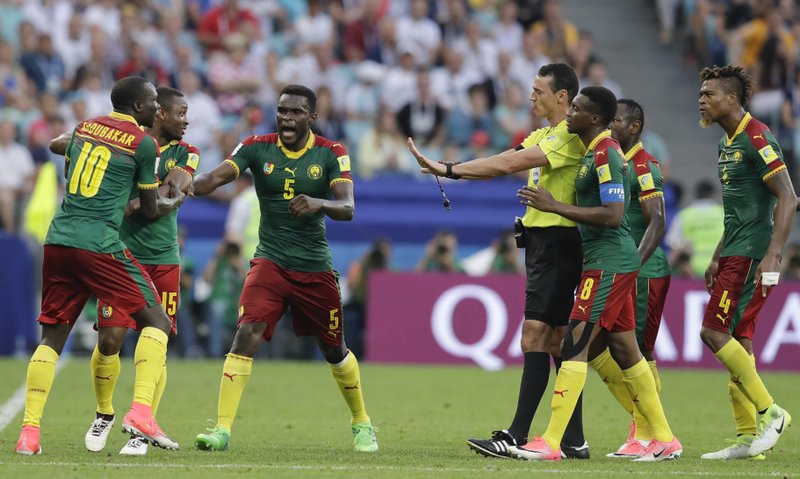FIFA’s video review system under scrutiny again in Russia

Cameroon players protest against referee Wilmar Roldan during the Confederations Cup, Group B soccer match between Germany and Cameroon, at the Fisht Stadium in Sochi, Russia, Sunday, June 25, 2017. (AP Photo/Thanassis Stavrakis)
SOCHI, Russia — FIFA’s new video review system is bringing turmoil to the Confederations Cup, with technology designed to deliver quick, clear decisions agitating players and leaving coaches and fans confused.
Perhaps even worse for FIFA, the latest controversy on Sunday — exactly one week after four goal reviews in that day’s two matches — made one of the world’s highest-rated referees look hesitant and wrong.
Wilmar Roldan sent off a Cameroon defender more than three minutes after a high tackle on a German opponent and only after his own case of mistaken identity.
The Colombian official arrived at what was arguably the correct decision following two visits to the touchline to consult video replays and first showing only a yellow card, then a red card, to the wrong Cameroon player.
“I think everyone is confused, including me,” Cameroon coach Hugo Broos said of referee Roldan after a 3-1 loss in Sochi that eliminated his team. “He and he alone can explain what happened there in that moment.”
Cameroon was also involved in two video decisions last Sunday, when possible Chile goals were reviewed for offside rulings. The first goal was disallowed, the second counted in Chile’s 2-0 victory.
Portugal had most to complain about one week ago when a potential opening goal in a 2-2 draw with Mexico was ruled out by an offside judged in an earlier phase of play.
FIFA stressed last week that all decisions proved ultimately correct, and the controversies were simply inevitable overreactions as world football gets used to a new system being put to its highest-profile tests.
Indeed, FIFA President Gianni Infantino felt confident to proclaim video review was “the future of football” and still on track to be approved by the guardians of the game’s laws before the 2018 World Cup.
Human error by Roldan seemed the biggest problem Sunday though it added to the perception that video review is capable of causing as much controversy as it solves.
FIFA has certainly pulled back from its prediction last year that game-changing decisions — goals scored, penalty kicks awarded, red cards, mistaken identity — could be reviewed and resolved in as few as six seconds.
Accuracy is more important than speed, has become the mantra in Russia.
Neither were in evidence Sunday in Sochi as Cameroon defender Ernest Mabouka eventually left the field around three minutes after his boot connected with Emre Can of Germany.
Mabouka’s teammate Sebastien Siani had sarcastically applauded the referee when he was wrongly sent from the field. Eventually Siani’s slate was wiped clean and he completed the match.
Still, the image of a top referee being openly disrespected will not please FIFA.
Roldan arrived at the Confederations Cup trying to rebuild a reputation that was damaged at the 2014 World Cup. There, he was chosen for the second game of the tournament, and incorrectly ruled out two Mexico goals. FIFA did not pick him for another refereeing duty in Brazil.
To further damage Roldan’s standing, Germany coach Joachim Loew said neither he nor Can believed the tackle merited even a yellow card.
“I didn’t have the impression that it was a mean foul with the intent to hurt the opponent. It was not intentional,” Loew said through a translator at the post-match news conference.
Loew, whose Germany team will defend its World Cup title next year, still thinks video review can benefit the game — with one condition.
“I think it can be fine-tuned over time so that decisions can be made more quickly,” the German coach said. “That would be great.”